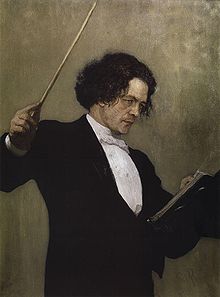- The Demon (opera)
-
Anton Rubinstein  Operas
Operas- Dmitry Donskoy (1852)
- Fomka the Fool (1853)
- Die Kinder der Heide (1861)
- Feramors (1863)
- Der Thurm zu Babel (1870)
- The Demon (1871)
- Die Maccabäer (1875)
- Néron (1879)
- The Merchant Kalashnikov (1880)
- Christus (1895)
The Demon (Russian: Демон) is an opera in three acts (six scenes) by Russian composer Anton Rubinstein. The work was composed in 1871. The libretto was by Pavel Viskovatov, based on the poem of the same name by Mikhail Lermontov.
Contents
Background
Lermontov's poem was banned as sacrilegious until 1860. Its popularity and its lurid story made it an excellent candidate for an opera libretto, and Rubinstein himself worked out the scenario from which Viskovatov produced the final text.[1]The opera was premiered at the Mariinsky Theatre, St. Petersburg, on 25 January [O.S. 13 January] 1875, conducted by Eduard Nápravník. The stage design was by Mikhayil Bocharov, Matvey Shishkov, and Lagorio. The Moscow premiere was in 1879 at the Bolshoi Theatre, conducted by Enrico Bevignani[2]
The opera was published by V. Bessel and Co., St. Petersburg, in 1876.[3]A further edition was in 1968 by Muzgiz, Moscow.
Critical reception
Rubinstein invited several musicians of the group known as The Five, including César Cui, Modest Mussorgsky and Nikolai Rimsky-Korsakov, as well as the critic Vladimir Stasov to a private hearing of the opera in September 1871, where the guests did not regard the work favourably. However, melodic motifs from The Demon inspired comparable motifs in Mussorgsky's Khovanshchina and Tchaikovsky's Eugene Onegin.[4]
The opera received 100 performances in the first decade following its premiere. Its first performance in Paris was in May 1911, where the critics considered the opera to be old-fashioned.[5]
Whilst it is still quite frequently performed in Russia, the opera has become a rarity in the West.
Roles
Role Voice St. Petersburg 1875 Moscow 1879 Prince Gudal bass Osip Petrov Anton Bartsal Tamara,his daughter soprano Wilhelmina Raab Yelena Verni Tamara's Nurse contralto Prince Sinodal, Tamara's betrothed tenor Fyodor Komissarzhevsky Sinodal's servant bass Courier tenor Demon bass-baritone Ivan Melnikov Bogomir Korsov Angel contralto Aleksandra Krutikova Chorus: Evil and good spirits, Georgians, guests, Tatars, servants, nuns Synopsis
- Time: Unspecified
- Place: Georgia
Act 1
Scene 1 Prologue
During a storm in the Caucasian mountains a chorus of evil spirits call upon the Demon to destroy the beauty of God's creation. The Demon sings of his hatred for the universe and rejects an Angel's plea for him to reconcile with heaven.
Scene 2
Tamara, awaiting her wedding with Prince Sinodal, is by a river with her attendants. The Demon sees her and falls in love with her. He promises her that "all the world will kneel before her" if she returns his love. Tamara is fascinated but frightened by him and returns to the castle.
Scene 3
Prince Sinodal's caravan is making its way to Prince Gudal's court for his marriage to Tamara but is delayed by a landslide. The Demon appears and vows that Prince Sinodal will never see Tamara again. The carvan is attacked by Tatars, and Prince Sinodal is mortally wounded. Before he dies he tells his servant to bring his body to Tamara.
Act 2
Scene 4
The festivities for the wedding have already begun. A messenger announces that Prince Sinodal's caravan has been delayed.[6] Tamara senses the presence of the Demon and is fearful. When Prince Sinodal's body is brought into the castle, Tamara is overcome by grief, but to her horror, keeps hearing the supernatural voice of the Demon and his promises. She begs her father to let her enter a convent.
Act 3
Scene 5
The Demon intends to enter the convent where Tamara is now living, believing that his love for her has opened his spirit to goodness. An Angel tries in vain to stop him.
Scene 6
Tamara prays in her convent cell but is constantantly troubled by thoughts of the Demon, who appears to her in her dreams. The Demon now appears in reality, declares his love for her and begs her to love him in return. Tamara tries to resist her attraction to him but fails. The Demon kisses her in triumph. The Angel suddenly appears and shows her the ghost of Prince Sinodal. In horror, Tamara struggles out of the Demon's arms and falls dead.
Epilogue and Apotheosis
The Angel proclaims that Tamara has been redeemed by her suffering, while the Demon is damned to eternal solitude. The Demon curses his fate. In the final Apotheosis Tamara's soul is carried to Heaven accompanied by angels.
References
- Notes
- ^ Taruskin, Demon, The
- ^ Source: Театральная Энциклопедия (Theatrical Encyclopedia published by Sovetskaya Entsiklopediya)
- ^ British Library online catalogue
- ^ Abraham (1945)
- ^ Garden (1998).
- ^ This fragment — aria of Sinodal and Chorus of Men sung at the caravan's camp — in a Soviet (1960) movie version of Demon — http://www.youtube.com/watch?v=YOkz4PzimIU
- Sources
- Abraham, Gerald, "Anton Rubinstein: Russian Composer" (December 1945). The Musical Times, 86 (1234): pp. 361-365.
- Garden, Edward, "Reviews of Books: Anton Rubinstein and Nikolai Rimsky-Korsakov: Selected Operas. Proceedings of the International Musicological Convention in Vorzel (Ukraine), May 4th-6th, 1994 (November 1998). Music & Letters, 79 (4): pp. 622-624.
- Taruskin, Richard. Demon, The, in Oxford Music Onlne, accessed 21 April 2010
External links
- The Demon (opera): Free scores at the International Music Score Library Project.
Categories:- Russian-language operas
- Operas by Anton Rubinstein
- Operas
- 1875 operas
- Operas based on works by Mikhail Lermontov
- Operas set in Georgia
Wikimedia Foundation. 2010.
